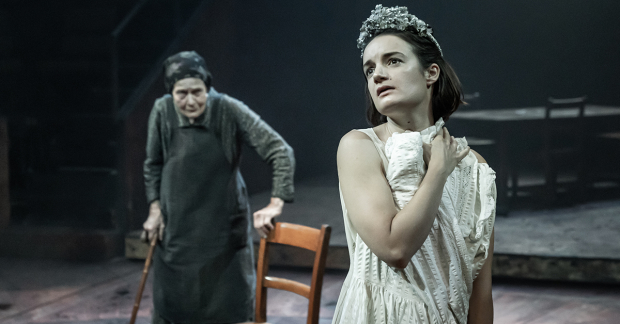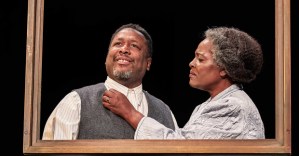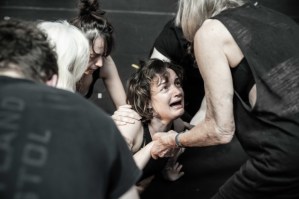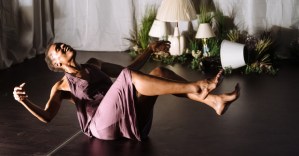
© Marc Brenner
George R R Martin eat your horse hearts out – when it comes to tragic nuptials, Federico García Lorca was streets ahead in his 1933 drama Blood Wedding, which is newly translated by Marina Carr and staged by Yaël Farber at the Young Vic. Following a thorny, carnal and ultimately blood-splotched love triangle that drives a wedge down the centre of a community, it's hard not to be enthralled by the melancholic majesty of Lorca's plot – the ticking countdown to tragedy as knives are drawn and lives are ended.
The last time the Spanish writer was staged at the London venue Simon Stone transformed Yerma (written one year after Blood Wedding) into a riveting and rawly human story. Farber leans in a very different direction with her production – doubling down on the rustic, gritty setting and ramping up the otherworldly presence of characters like Death and a sentient Moon. Set in an indistinct yet pastoral world – part-Iberian part-Irish – the play largely follows the Bride (an enigmatic turn from Aoife Duffin, with a cold exterior but burning wit beneath), who believes there must be more than her provincial life and has a long-suppressed and destructive love for married man Leonardo. Another hitch is that she herself is about to marry the Groom – whose brother and father were murdered by Leonardo's (a solid turn from Gavin Drea) family.
Undercurrents of violence ripple through the production – a small yet noticeable puddle of blood sits at the centre of the performance space as the audience enter, while Susan Hilferty's in-the-round staging, with greasy, splotched wooden paneling, makes you feel like you're staring into a fighting pit.
Spasmodically this menace spills over into outright confrontation – Leonardo throws his expectant wife onto a bed in anger, while the Groom aggressively clenches the wrists of his spouse mere hours after their wedding ceremony. Carr brings out the animalistic savagery in the text – the Bride is referred to like a prized horse, "with hips for the task ahead".
These physical displays of domination are at odds with the Mother's (a stand-out turn from Olwen Fouéré) blunt, dismissive reaction to her son's inability to curb his new wife's excesses: "Women are savages – crush you like a flower if they see a sign of weakness". Another brief moment between Duffin and Drea seems to directly echo the stellar Stella Brando scene from A Streetcar Named Desire, turning from turbulence to tenderness. It's a captivating foray into the gendered nature of romance in a society where convention forces women to deal with the consequences of bloodletting – by the end of the show, they're left to mop up.
Emma Laxton's sound design keeps a low rumble playing throughout – as if some seismic, subterranean force is about to burst onto the stage. It's a crescendo that, just like the entire show, never really seems to climax – as things are about to explode Farber's production dallies, alighting for too long on a protracted discussion between a pair of ominous yet intriguing woodcutters and Thalissa Teixeira's spectral spectator of a Moon who orbits the stage, singing out Isobel Waller-Bridge's hauntingly entrancing compositions.
While fascinating, it can all feel a bit formless. The tragic ending is so overwhelmingly inevitable that it robs the show of any tension, while the muted colour palette leaves you craving something more radical. Farber and Carr delve uncompromisingly into the violence of the community but the passion feels muted, almost abstract and unpresent.
The best moments are fleet and wondrous – when, for example, like a ghostly stallion Drea floats on a strap around the stage, escaping with his reckless lover running alongside. But they're small rays of invention peppered in a near-two-hour production that yearns for more.



















